| Srl | Item |
| 1 |
ID:
123636
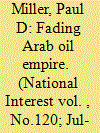

|
|
|
|
|
| Publication |
2012.
|
| Summary/Abstract |
PRESIDENT OBAMA'S pivot to East Asia is well-timed. The geostrategic importance of the Middle East is vastly overblown. The region matters to the United States chiefly because of its influence in the world oil market, but that influence has been in terminal decline for a generation, a fact almost wholly unnoticed by outside observers. A confluence of developments-including rising prices and production costs, declining reserves, and the availability of alternate fuels and unconventional sources of oil-will decisively undermine the defining role of the Middle East in the global energy market. Meanwhile, the United States has vital interests at stake elsewhere in the world at least as pressing, if not more so, than its interests in the Middle East. These include thwarting the proliferation of weapons of mass destruction, fighting transnational terrorism and maintaining stability in key strategic locations of the world.
|
|
|
|
|
|
|
|
|
|
|
|
|
|
|
|
| 2 |
ID:
107215


|
|
|
| 3 |
ID:
073738
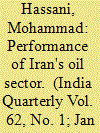

|
|
|
| 4 |
ID:
095377
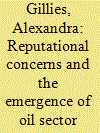

|
|
|
|
|
| Publication |
2010.
|
| Summary/Abstract |
This study argues that the reputational concerns of several high-profile actors drove the emergence of oil sector transparency as an international norm. Thanks to successful advocacy campaigns, developing country oil sector operations began to pose increasing levels of reputational risk to Western governments, international institutions, and corporations. These actors responded to this scrutiny by facilitating the evolution of transparency into a widely cited oil sector "best practice." However, the self-interests of these actors also altered the course of the norm's definition and institutionalization in ways which may constrain its eventual impact on industry behaviors. This study narrates the surprising and rapid spread of the transparency norm in developing country oil affairs, a process which suggests that reputational utility should be considered as a possible explanation for norm emergence.
|
|
|
|
|
|
|
|
|
|
|
|
|
|
|
|
| 5 |
ID:
175444
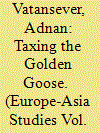

|
|
|
|
|
| Summary/Abstract |
There has been one defining characteristic of Russia’s approach to taxing the oil sector during the Putin era. Successive governments have illustrated an inbuilt resistance to adopting a comprehensive tax regime that would take into account the sector’s costs and profitability. This has defied international trends among a growing number of oil-rich countries. This article centres on three explanations. The concentration of power around the executive branch, the organisational setup of the oil industry and ‘path dependence’ have all made Russia less likely to shift away from its adherence to more traditional means of taxation and ad hoc policy solutions.
|
|
|
|
|
|
|
|
|
|
|
|
|
|
|
|
| 6 |
ID:
147113
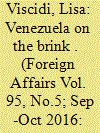

|
|
|
|
|
| Summary/Abstract |
Venezuela is in the throes of its most tumultuous political and economic period [1] in decades. The collapse of global energy prices has wreaked havoc on the country’s economy. Estimates vary, but oil production has fallen from a peak of around 3.2 million barrels per day in 1997 to somewhere between 2.2 million and 2.5 million barrels per day today. Oil and gas account for more than 95 percent of Venezuela’s revenues from exports, and the country produces few other goods. Without the money it makes from exporting energy products, Venezuela[2] has struggled to import everything else its people need. As a result, Venezuelans are facing widespread shortages of food, medicine, and other basic supplies. Citizens wait in line for hours at supermarkets to buy staples such as rice; many have resorted to sifting through trash to find food. Military forces have been dispatched to oversee food production and distribution. Last year, a group of Venezuelan researchers estimated that, in contrast to relatively rosy official statistics, more than three-quarters of Venezuelans are living in poverty. And there is no relief in sight: by the end of the year, the economy will probably have contracted by eight percent and the inflation rate will likely reach 720 percent [3], according to the International Monetary Fund.
|
|
|
|
|
|
|
|
|
|
|
|
|
|
|
|